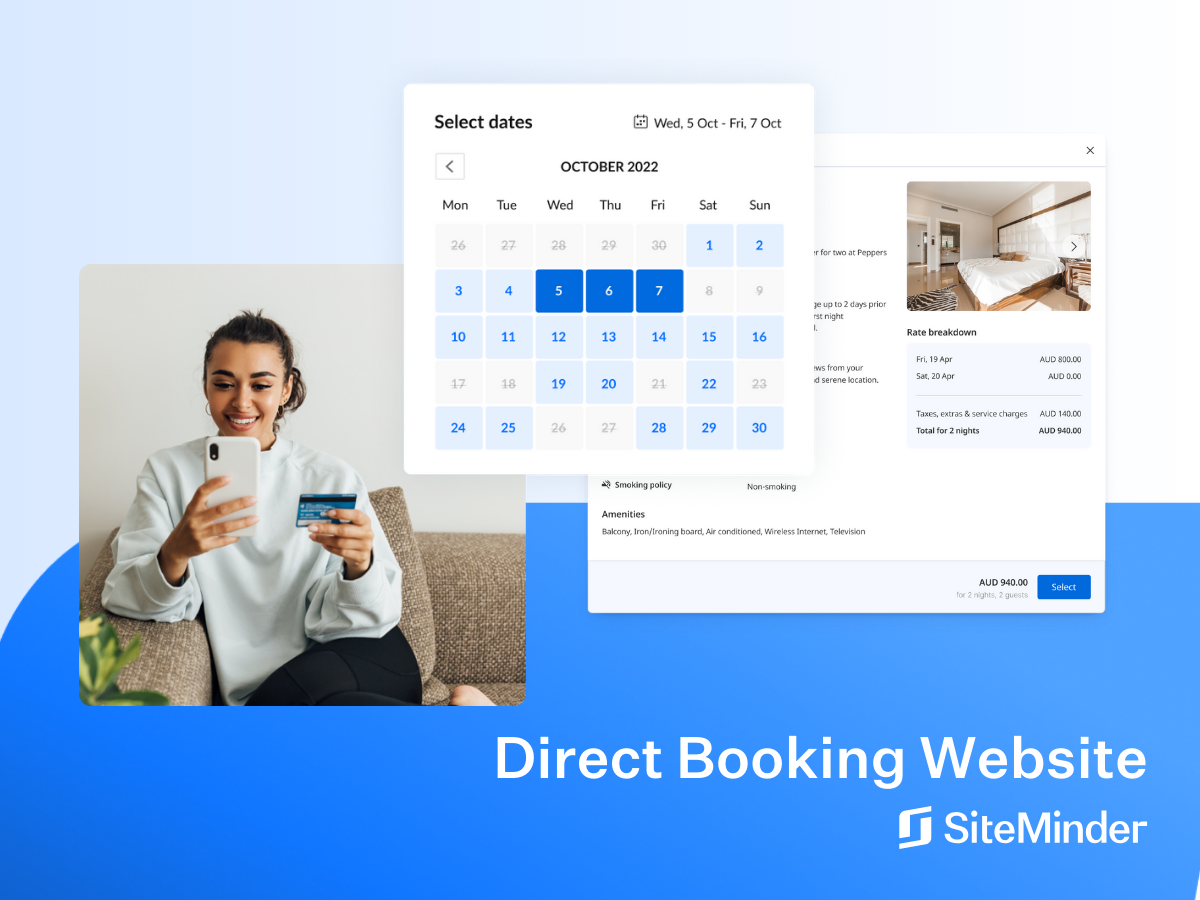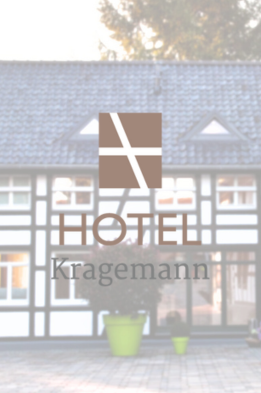What is a direct booking website?
A direct booking website is like your hotel’s very own online storefront. It’s a website that’s all about your hotel and nothing else. Here, guests can check out all the cool stuff your hotel offers, like comfy rooms, tasty breakfast, or that amazing rooftop pool. And if they like what they see, they can book a room right there and then. It’s open all day, every day, so guests from all over the world can make a booking whenever it suits them.
Rewind just 15 years and it’s likely most hotels would struggle with the concept of selling their rooms via any other third party than their dedicated, local travel agent. We’ve since moved on, of course, and, with digital technology continually shrinking the world, third party sites such as Expedia.com and Booking.com have become necessary checkpoints for today’s hotels. And yet, there are definite advantages to streamlining bookings and directing people back to your own website – your digital persona.
Now, this is different from websites like Expedia or Agoda. These are like huge online shopping malls where lots of different hotels have their own little store. These sites can help get your hotel in front of more eyeballs, but they also charge you a fee for every booking made through their platform. It’s like paying rent for having your store in their mall.
But with a direct booking website, you’re the boss. You don’t have to pay any fees for bookings, which means more money stays in your pocket. And because there’s no middleman, you can chat directly with your guests. This can help you understand what they like or don’t like, so you can make their stay even better. Plus, it’s a great way to build a relationship with your guests and make them feel special. And when guests feel special, they’re more likely to come back and even recommend your hotel to their friends.
So, a direct booking website is not just a place to get more bookings, it’s also a powerful tool to build relationships with your guests and keep them coming back for more.
This blog will take you through the whole process of how a direct booking website works and how to create one for your hotel.
Table of contents
What are the benefits of direct booking websites?
In the competitive world of hospitality, finding the right balance between different booking channels can significantly impact your bottom line. While Online Travel Agents (OTAs) can provide valuable exposure, they often come with hefty commission fees. That’s where a direct booking website comes in. By allowing guests to book directly with you, a direct booking website can offer a host of benefits, from lowering your overall cost of distribution to building strong brand awareness and rapport with your guests. Let’s delve into these benefits in more detail.
1. You can lower your overall cost of distribution
With some OTAs charging up to 30% in commissions, finding the right balance of online channels to advertise your property on can significantly increase your revenue. Because direct bookings are commission free, you can lower your overall cost of distribution by focusing on direct bookings as well as bookings from OTA’s.
2. You build strong brand awareness
By increasing traffic to your own website, you’ll have already fulfilled one fundamental marketing objective: Building brand awareness. In order to drive potential guests away from OTAs and to your site, work on your online presence. This includes:
- Enhancing your social media channels – Develop a social media strategy to maximise your reach on relevant platforms such as Facebook, Pinterest, Instagram and Twitter. Put up links, photos, new offers and promotions. Make it easy for potential guests to find your site.
- Optimising your website – Provide visitors with a user-friendly, well-designed interface that makes it easy to book.
- Ensuring there is brand consistency across all of your outlets – See social media platforms as an extension of The Online You.
- Having either a mobile optimised website or a website that has responsive design – Ensuring your rooms are bookable on mobile devices should be at the top of your ‘to do’ list. Mobile usage accounts for more than 25% of all web traffic, while 6% of the global population own a tablet – that’s 1 in every 17 people! Boost your brand and establish credibility. Direct engagement with potential guests will follow.
3. You build rapport directly with your guests
Being in touch with your guests directly allows you to build rapport. Consider offering value-add items as a thank you for booking directly with you, so you not only attract potential guests but keep them coming back.
One example of a hotel doing this well is The Alp Art Hotel in Austria, which offers a range of value-add deals for guests who book directly. From Best Price Guarantee, Personal Advice, Rental Deals and Re-visitor Deals, The Alp Art Hotel utilises all resources to turn lookers into bookers.
4. You deliver a more personalised experience for your guest
It’s all about customer service and direct communication. Guests enjoy their experience more when they feel looked after and receive personalised treatment, especially when they’re on holiday.
So, if handled correctly, a personalised experience can instil major trust with your guests, create loyalty and boost your brand’s credibility.
Optimise your guests’ experience by understanding the rational and emotional drivers they value most, and then deliver on those drivers across their touchpoints with your brand.
5. You increase your promoters
Satisfied customers are your greatest brand ambassadors. This means revenue. Guests who return to your property are crucial assets, so use these relationships to promote your brand further.
A survey of around 40,000 people, from more than 10 global loyalty programs, showed that a positive promoter score (positive people talk) can be created by redemption for experiences and unique items.
To quote the old adage, it’s often five times more costly to win new customers than it is to retain them, so don’t just focus on winning new customers; surprise your existing guests with tailored offers and keep the conversation going.
Direct online bookings are a crucial part of successfully capturing more market share, but it’s ultimately up to you to ensure the appropriate technology is in place to allow potential guests to book directly – and easily – through your website. Get an effective booking engine set up, then look to manage your online channels to further increase your market share.
Make direct booking easy at your hotel Use SiteMinder’s integrated platform to build a hotel website, take direct reservations, and automate your inventory management.
How to build a direct booking website
So how do you build your direct booking website? The process is the same whether you’re looking for a hotel booking site or an airbnb direct booking website.
There are two main steps:
Step 1: Build your website
This might sound daunting but it can actually be very simple. You don’t need to be a web developer or even hire one.
There are specific tools for hotels, like SiteMinder’s website builder, which can create a website in minutes. All you need to do is prepare your information, content, and images and the tool will do the rest.
Some essential items to tick off during this process include:
- Choosing a template and design that suits your needs
- Organise your logo and define your brand look and feel
- Customise the main pages that will be featured such as your homepage, about us, gallery, and your booking page
- Add information and high quality photos of your rooms and amenities
You should also make sure that you have language options available for overseas guests and integrations with apps like Google Maps and TripAdvisor so guests have access to all the details they need to make a booking decision.
Learn more about how this all works with SiteMinder’s website builder.
Step 2: Implement direct booking capability
To effectively take online bookings and payments, you need to integrate an online booking engine with your website.
As a bonus, a booking engine will also enable you to promote and be booked via metasearch sites and via your social media channels where you can place a direct link to your booking website.
By using a platform like SiteMinder, integration between your website and booking engine will be seamless.

What is the best direct booking website?
A robust online presence is no longer a luxury but a necessity for hotels. It’s the digital storefront that showcases your hotel’s unique offerings, attracts potential guests, and most importantly, drives direct bookings.
Here are two well-regarded platforms that you might consider:
- SiteMinder: SiteMinder’s platform combines sophistication with simplicity, with comprehensive features and integrations for medium to large independent hotels. Easily build your website, integrate your booking engine, and connect your channel manager.
- Little Hotelier: Little Hotelier is an all-in-one solution that lets small accommodation providers like B&Bs, motels, and guesthouses control their whole business from one place. This includes creating a direct booking website.
SiteMinder’s hotel website builder is designed to empower hoteliers to create a professional, engaging, and mobile-optimised website effortlessly.
With SiteMinder, you’re not just building a website; you’re crafting an online experience that encapsulates the essence of your hotel and entices potential guests to book directly. From selecting customisable themes that reflect your hotel’s aesthetic to integrating a seamless booking engine, SiteMinder’s website builder is a comprehensive tool that puts you in control of your hotel’s online narrative.
- Effortless Website Creation: With SiteMinder, you can create a professional, mobile-optimised hotel website without the need for web developers. Choose from a range of customisable themes and make your website truly unique.
- SEO-Friendly Design: SiteMinder’s website builder is designed with search engine optimisation in mind. From HTTPS security to well-structured HTML and CSS, SiteMinder helps your hotel rank highly on search engine results pages.
- Integrated Booking Engine: Seamlessly integrate your website with SiteMinder’s Booking Engine for a smooth booking experience. Plus, display promotions and optional extras to convert last-minute bookings.
Choosing a direct booking website builder
When it comes to making a purchase decision, some non-negotiables include:
- Being able to take bookings and payments directly from guests on your site
- The ability to accept bookings via metasearch and via social media.
- Seamless integration between your website, booking engine, and channel manager.
- The integrity and consistency of your brand must be maintained.
- Multi-language and multi-currency options available for guests.
- Mobile optimised design to cater to guests on the move or booking last minute.
It can certainly help to do thorough research by reading reviews, watching demos, and even trialling products to see if they match your requirements.
This can also be important for understanding the level of training and support you’ll have access to with your provider.

